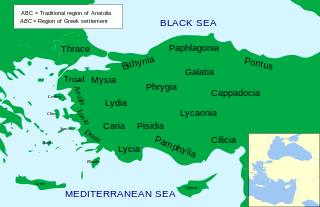This article concerns the period 69 BC – 60 BC.

Nicomedes IV Philopator was the king of Bithynia from c. 94 BC to 74 BC. He was the first son and successor of Nicomedes III of Bithynia.

Lucius Cornelius Sulla Felix, commonly known as Sulla, was a Roman general and statesman. He won the first major civil war in Roman history and became the first man of the Republic to seize power through force.

Lucius Licinius Lucullus was a Roman general and statesman, closely connected with Lucius Cornelius Sulla. In culmination of over 20 years of almost continuous military and government service, he conquered the eastern kingdoms in the course of the Third Mithridatic War, exhibiting extraordinary generalship in diverse situations, most famously during the Siege of Cyzicus in 73–72 BC, and at the Battle of Tigranocerta in Armenian Arzanene in 69 BC. His command style received unusually favourable attention from ancient military experts, and his campaigns appear to have been studied as examples of skillful generalship.

The Second Mithridatic War was one of three wars fought between Pontus and the Roman Republic. This war was fought between King Mithridates VI of Pontus and the Roman general Lucius Licinius Murena.

The Mithridatic Wars were three conflicts fought by the Roman Republic against the Kingdom of Pontus and its allies between 88 – 63 BCE. They are named after Mithridates VI, the King of Pontus during the course of the wars who initiated the hostilities with Rome. Mithridates led the Pontic forces in every war. The Romans were led by various generals and consuls throughout the wars, namely Lucius Cornelius Sulla, Lucius Licinius Lucullus, and Gnaeus Pompey Magnus.

Asia was a Roman province covering most of western Asia Minor (Anatolia), which was created following the Roman Republic's annexation of the Attalid Kingdom in 133 BC. After the establishment of the Roman Empire by Augustus, it was the most prestigious senatorial province and was governed by a proconsul. That arrangement endured until the province was subdivided in the fourth century AD.

The First Mithridatic War was a war challenging the Roman Republic's expanding empire and rule over the Greek world. In this conflict, the Kingdom of Pontus and many Greek cities rebelling against Roman rule were led by Mithridates VI of Pontus against Rome and the allied Kingdom of Bithynia. The war lasted five years and ended in a Roman victory, which forced Mithridates to abandon all of his conquests and return to Pontus. The conflict with Mithridates VI later resumed in two further Mithridatic Wars.
Lucius Licinius Murena was a Roman soldier and politician. He was notable for playing an important role in the Roman victory against the forces of Mithridates VI of Pontus at the Battle of Chaeronea in 86 BC during the First Mithridatic War and for starting another war, the Second Mithridatic War, against Mithridates in Asia Minor without the authorisation of the Roman senate.

The Third Mithridatic War, the last and longest of the three Mithridatic Wars, was fought between Mithridates VI of Pontus and the Roman Republic. Both sides were joined by a great number of allies, dragging the entire east of the Mediterranean and large parts of Asia into the war. The conflict ended in defeat for Mithridates; it ended the Pontic Kingdom and the Seleucid Empire, and also resulted in the Kingdom of Armenia becoming an allied client state of Rome.
Archelaus was a prominent Greek general who served under King Mithridates VI of Pontus in northern Anatolia and was also his favorite general.

Pontus was a Hellenistic kingdom centered in the historical region of Pontus in modern-day Turkey, and ruled by the Mithridatic dynasty of Persian origin, which may have been directly related to Darius the Great of the Achaemenid dynasty. The kingdom was proclaimed by Mithridates I in 281 BC and lasted until its conquest by the Roman Republic in 63 BC. The Kingdom of Pontus reached its largest extent under Mithridates VI the Great, who conquered Colchis, Cappadocia, Bithynia, the Greek colonies of the Tauric Chersonesos, and for a brief time the Roman province of Asia. After a long struggle with Rome in the Mithridatic Wars, Pontus was defeated.

Mithridates or Mithradates VI Eupator was the ruler of the Kingdom of Pontus in northern Anatolia from 120 to 63 BC, and one of the Roman Republic's most formidable and determined opponents. He was an effective, ambitious and ruthless ruler who sought to dominate Asia Minor and the Black Sea region, waging several hard-fought but ultimately unsuccessful wars to break Roman dominion over Asia and the Hellenic world. He has been called the greatest ruler of the Kingdom of Pontus. He cultivated an immunity to poisons by regularly ingesting sub-lethal doses; this practice, now called mithridatism, is named after him. After his death, he became known as Mithridates the Great.

Cappadocia was a province of the Roman Empire in Anatolia, with its capital at Caesarea. It was established in 17 AD by the Emperor Tiberius, following the death of Cappadocia's last king, Archelaus.

Bithynia and Pontus was the name of a province of the Roman Empire on the Black Sea coast of Anatolia. It was formed during the late Roman Republic by the amalgamation of the former kingdoms of Bithynia and Pontus. The amalgamation was part of a wider conquest of Anatolia and its reduction to Roman provinces.

Classical Anatolia is Anatolia during classical antiquity. Early in that period, Anatolia was divided into several Iron Age kingdoms, most notably Lydia in the west, Phrygia in the center and Urartu in the east. Anatolia fell under Achaemenid Persian rule c. 550 BC. In the aftermath of the Greco-Persian Wars, all of Anatolia remained under Persian control except for the Aegean coast, which was incorporated in the Delian League in the 470s BC. Alexander the Great finally wrested control of the whole region from Persia in the 330s BC. After Alexander's death, his conquests were split amongst several of his trusted generals, but were under constant threat of invasion from both the Gauls and other powerful rulers in Pergamon, Pontus, and Egypt.

The siege of Athens and Piraeus was a siege of the First Mithridatic War that took place from autumn of 87 BC to the spring of 86 BC. The battle was fought between the forces of the Roman Republic, commanded by Lucius Cornelius Sulla Felix on the one hand, and the forces of the Kingdom of Pontus and the Athenian City-State on the other. The Greek Pontian forces were commanded by Aristion and Archelaus.

The Kingdom of Bithynia was a Hellenistic kingdom centred in the historical region of Bithynia, which seems to have been established in the fourth century BC. In the midst of the Wars of the Diadochi, Zipoites assumed the title of king (basileus) in 297 BC. His son and successor, Nicomedes I, founded Nicomedia, which soon rose to great prosperity. During his long reign, as well as those of his successors, Prusias I, Prusias II and Nicomedes II, the Kingdom of Bithynia prospered and had a considerable standing and influence among the minor monarchies of Anatolia. But the last king, Nicomedes IV, was unable to maintain himself in power against Mithridates VI of Pontus. After being restored to his throne by the Roman Senate, he bequeathed his kingdom through his will to the Roman republic in 74 BC and it became the province of Bithynia et Pontus in 63 BC.

The Battle of Histria, c. 62–61 BC, was fought between the Bastarnae peoples of Scythia Minor and the Roman Consul Gaius Antonius Hybrida. The Bastarnae emerged victorious from the battle after successfully launching a surprise attack on the Roman troops; Hybrida escaped alongside his cavalry forces leaving behind the infantry to be massacred by the Bastarnian-Scythian attackers.
The Fimbrian or Valerian legions were two Roman legions which served and fought in all three wars against King Mithridates of Pontus, one of the Roman Republic's chief adversaries during the 80s, 70s and 60s BC. They became a body of long serving legionaries known for their fierce fighting reputation and also, more infamously, for mutiny and abandoning their commander. The legions take their name from the consul Lucius Valerius Flaccus, who first recruited them in 86 BC, and from his subordinate, Gaius Flavius Fimbria, who took command of the legions after inciting a mutiny and murdering Flaccus.














